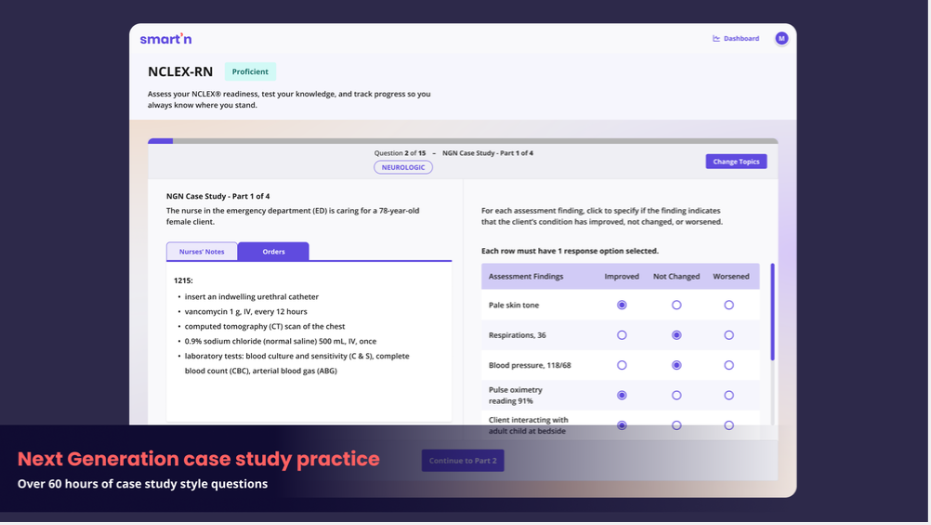How To Become A Clinical Nurse Specialist (CNS) In 2023? + Salary
As healthcare continues to evolve and the demand for specialized nursing professionals rises, pursuing a career as a clinical nurse specialist (CNS) has become an appealing choice for those who want to become nurses.
In this article, we'll explore the steps and qualifications required to become a CNS in 2023. We'll also discuss the salary prospects associated with this role. So, let's dive in and discover the exciting journey of becoming a clinical nurse specialist.
Understanding the role of a clinical nurse specialist
A clinical nurse specialist (CNS) is an advanced practice registered nurse (APRN) who specializes in a particular area of healthcare, such as pediatrics, geriatrics, or critical care.
Their role involves direct patient care, education, research, leadership, and advocacy. They provide expert clinical care, educate healthcare professionals, conduct research, and serve as leaders and consultants.
CNSs play a vital role in improving patient outcomes and advancing healthcare in their specialized area.
Education and training requirements of clinical nurse specialists
The education and training CNS requirements typically include the following:
- Bachelor's degree in nursing (BSN)
To embark on the journey of becoming a clinical nurse specialist, the first step is to obtain a Bachelor's Degree in Nursing (BSN) from an accredited institution or nursing school. The BSN program provides a solid foundation in nursing theory, clinical skills, and healthcare ethics.
- Licensure as a registered nurse (RN)
After completing the BSN program, aspiring CNSs must obtain licensure as a Registered Nurse (RN). This involves passing the National Council Licensure Examination for Registered Nurses (NCLEX-RN), which ensures that nurses have the necessary knowledge and skills to practice safely and effectively.
Smart’n
Achieving success in the NCLEX exam requires thorough preparation and practice. That's where Smart'n can assist you. Smart'n offers valuable resources to help you prepare for the NCLEX exam effectively.
By utilizing Smart'n, you gain access to a comprehensive set of study materials. These materials include over 2,500 practice questions and more than 60 hours of nursing case studies. Additionally, answer guides are provided to help you understand the correct responses.
One of the key features of Smart'n is the NGN NCLEX-style case studies. These case studies enable you to evaluate your critical thinking and clinical judgment skills. You can monitor your progress and assess your knowledge at each level of preparation. Based on your performance, Smart'n generates specific quizzes tailored to enhance your chances of success on the actual exam day.
- Clinical experience
Gaining practical experience as an RN is essential for clinical nurse specialists. Clinical experience allows nurses to develop critical thinking, decision-making, and patient care skills in a real-world healthcare setting.
The National Association of Clinical Nurse Specialists recommends a minimum of 500 faculty-supervised clinical hours related to the clinical nurse specialist role and population.
- Continuing education
To advance in the field of CNS nursing, a Master's Degree in Nursing (MSN) is typically required. Getting a Doctor of Nursing Practice (DNP) is also beneficial.
These clinical nurse specialist degrees and nursing programs build upon the foundational knowledge acquired during the BSN and provide specialized education in advanced nursing practice.
- Specialization in a clinical area
During the MSN program, clinical nurse specialists have the opportunity to choose a clinical specialization that aligns with their interests and career goals. Common specialties include adult gerontology, pediatrics, psychiatric-mental health, and women's health.
- Certification as a clinical nurse specialist
After completing the MSN or DNP program, obtain additional CNS certification(s) in the desired specialty area from an approved national certifying body, such as the American Nurses Credentialing Center (ANCC) or the American Association of Critical-Care Nurses (AACN).
Check with the state board of nursing to determine which certifications are accepted and apply for state certification in the state where you wish to practice as a clinical nurse specialist.
It's important to note that specific clinical nursing requirements and regulations may vary by state. Therefore, it is advisable to check with the state board of nursing for the exact requirements and regulations in your state.
Job responsibilities of a clinical nurse specialist
As a clinical nurse specialist, your responsibilities would include:
Assessing and diagnosing patients' healthcare needs within your specialized area.
Developing and implementing evidence-based care plans to meet patients' specific needs.
Collaborating with healthcare teams to provide comprehensive and coordinated patient care.
Educating patients, families, and other healthcare professionals on disease management and prevention.
Participating in research and quality improvement initiatives to enhance healthcare outcomes.
Serving as a mentor and resource for nursing staff, sharing your expertise, and promoting professional development.
Skills and qualities of an effective clinical nurse specialist
To excel as a clinical nurse specialist, certain skills and qualities are essential. These include:
Strong clinical knowledge and expertise in your specialized area.
Excellent critical thinking and problem-solving abilities.
Effective communication and interpersonal skills.
Leadership and teamwork skills to collaborate with interdisciplinary teams.
Continuous learning and adaptability to stay updated with the latest advancements in healthcare.
Empathy, compassion, and the ability to provide patient-centered care.
The salary outlook for clinical nurse specialists in 2023
The salary of a clinical nurse specialist can vary based on factors such as experience, location, and specialization. According to the 2023 data, the median annual wage for a clinical nurse specialist is $106,407.
As the demand for specialized nursing professionals continues to grow, the salary outlook for clinical nurse specialists in 2024 is expected to be favorable.
Career advancement opportunities for clinical nurse specialists
Becoming a clinical nurse specialist opens up various career advancement opportunities. With experience and further education, you can pursue roles such as:
Clinical nurse specialist manager: Overseeing a team of CNSs and guiding their practice.
Nurse educator: Sharing your expertise by teaching aspiring nurses or conducting continuing education programs.
Healthcare administrator: Taking on leadership roles in healthcare organizations and shaping policies and procedures.
Researcher: Contributing to the advancement of nursing knowledge through research and scholarly activities.
Job market and demand for clinical nurse specialists
The demand for clinical nurse specialists is expected to be strong in the coming years. As healthcare systems strive to improve patient outcomes and reduce healthcare costs, the expertise of CNSs in specialized areas becomes increasingly valuable.
With the aging population and the need for advanced healthcare services, the clinical nurse specialist job market is projected to grow significantly.
Challenges of becoming a clinical nurse specialist
Becoming a clinical nurse specialist comes with its own set of challenges. Here are some of the challenges associated with becoming a clinical nurse specialist:
1. Educational preparation:
The complexity of the CNS role creates challenges in the educational preparation of CNSs. It can be challenging to find room in the curriculum to address all seven core competencies of a CNS, including direct care, consultation, systems leadership, collaboration, coaching, research, and ethical decision-making. Additionally, addressing complex diseases and health issues can be problematic.
2. Lack of standardization:
There is a lack of standardization in educational preparation, regulation, and advanced practice recognition across states, which has posed challenges for CNS nurses and the development and sustainability of CNS education programs. The inconsistency in requirements and regulations can create confusion and hinder the mobility of clinical nurse specialists across different states.
3. Adequacy of resources:
There are concerns regarding the adequacy of faculty, clinical preceptors, clinical practicum settings, physical resources, and funding sources for CNS students. These resources are essential for providing quality education and clinical experiences to CNS students, but their availability can vary and may be limited in some settings.
4. Role implementation:
After completing the educational requirements, clinical nurse specialists may face challenges when implementing their role in practice. Integration into healthcare systems and establishing themselves as valuable members of the healthcare team can be a gradual process. It requires building relationships, earning the trust of colleagues, and demonstrating the value of the CNS role in improving patient outcomes and healthcare delivery
5. Scope of practice:
The scope of practice for CNSs can vary depending on state regulations and institutional policies. Some CNSs may face challenges related to limitations in their authority to prescribe medications, order diagnostic tests, or make independent clinical decisions. Collaborating with other healthcare professionals and advocating for the full utilization of their skills and expertise can help overcome these challenges.
6. Keeping up with advances:
As healthcare is constantly evolving, clinical nurse specialists need to stay updated with the latest research, evidence-based practices, and technological advancements. Continuing education and professional development are crucial for maintaining competence and providing high-quality care. However, finding the time and resources to stay current in a rapidly changing field can be a challenge.
Addressing these challenges requires collaboration between regulatory bodies, educational institutions, healthcare organizations, and CNS professionals. Efforts to standardize education and practice requirements, increase resources for education and clinical training, and promote the recognition and value of the CNS role can help overcome these challenges and ensure the effective utilization of clinical nurse specialists in healthcare settings.
Conclusion
Becoming a clinical nurse specialist in 2023 is an exciting and rewarding journey. By completing the necessary education, gaining clinical experience, and obtaining certification in your chosen specialization, you can enter a fulfilling career where you make a positive impact on patient care and healthcare outcomes. With favorable salary prospects and numerous career advancement opportunities, the role of a clinical nurse specialist offers both personal and professional growth.
FAQs
1. How long does it take to become a clinical nurse specialist?
The time required to become a CNS can vary. It typically takes around 4 years to complete a Bachelor's Degree in Nursing (BSN) and an additional 2-3 years to obtain a Master's Degree in Nursing (MSN).
2. What is the difference between a clinical nurse specialist and a Nurse Practitioner?
While both CNSs and Nurse Practitioners are advanced practice nurses, their roles differ. CNSs focus on specialized patient care, education, and improving healthcare outcomes within a specific clinical area.
Nurse Practitioners, on the other hand, provide primary care services, including diagnosing and treating illnesses, prescribing medications, and managing overall patient health.
3. Can I become a clinical nurse specialist in a specific area of interest?
Yes, clinical nurse specialists have the opportunity to specialize in various areas such as pediatrics, geriatrics, critical care, oncology, or mental health. Choosing a specialization allows you to focus on a specific patient population and provide specialized care.




